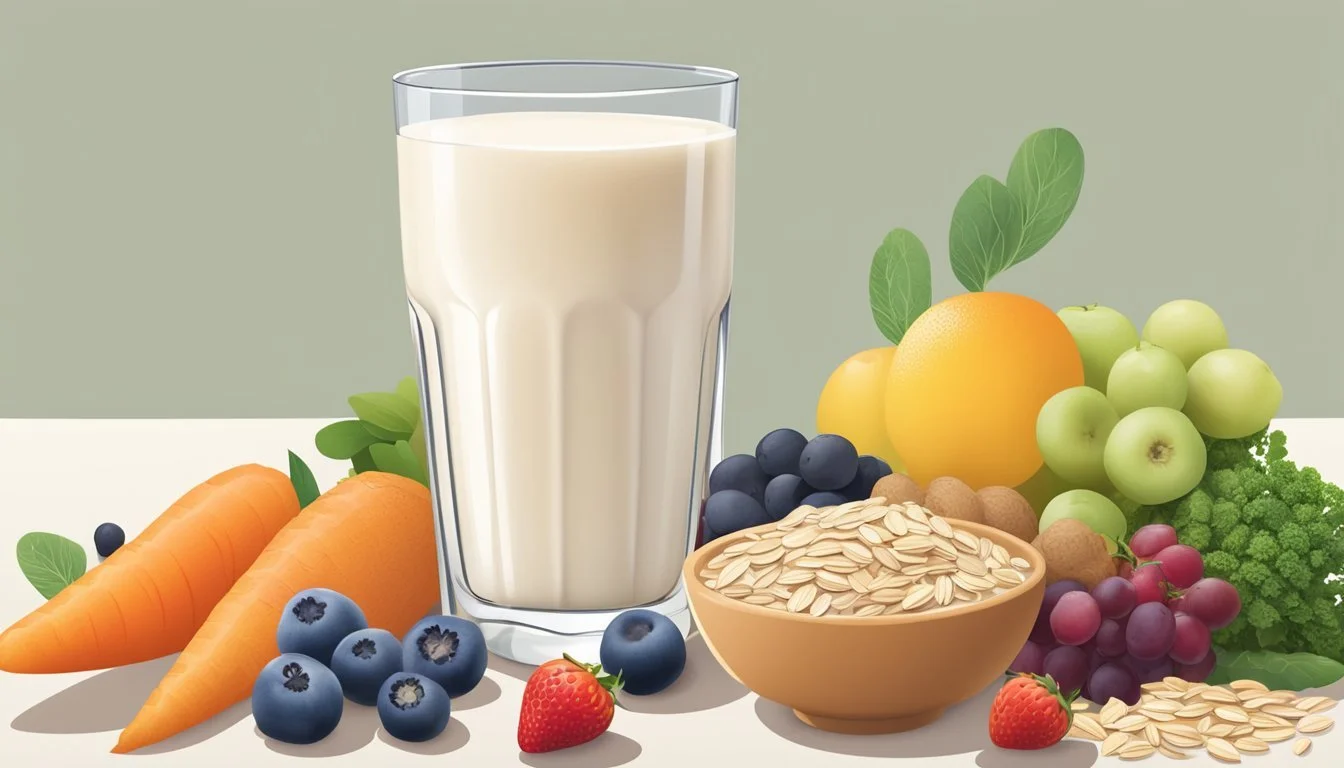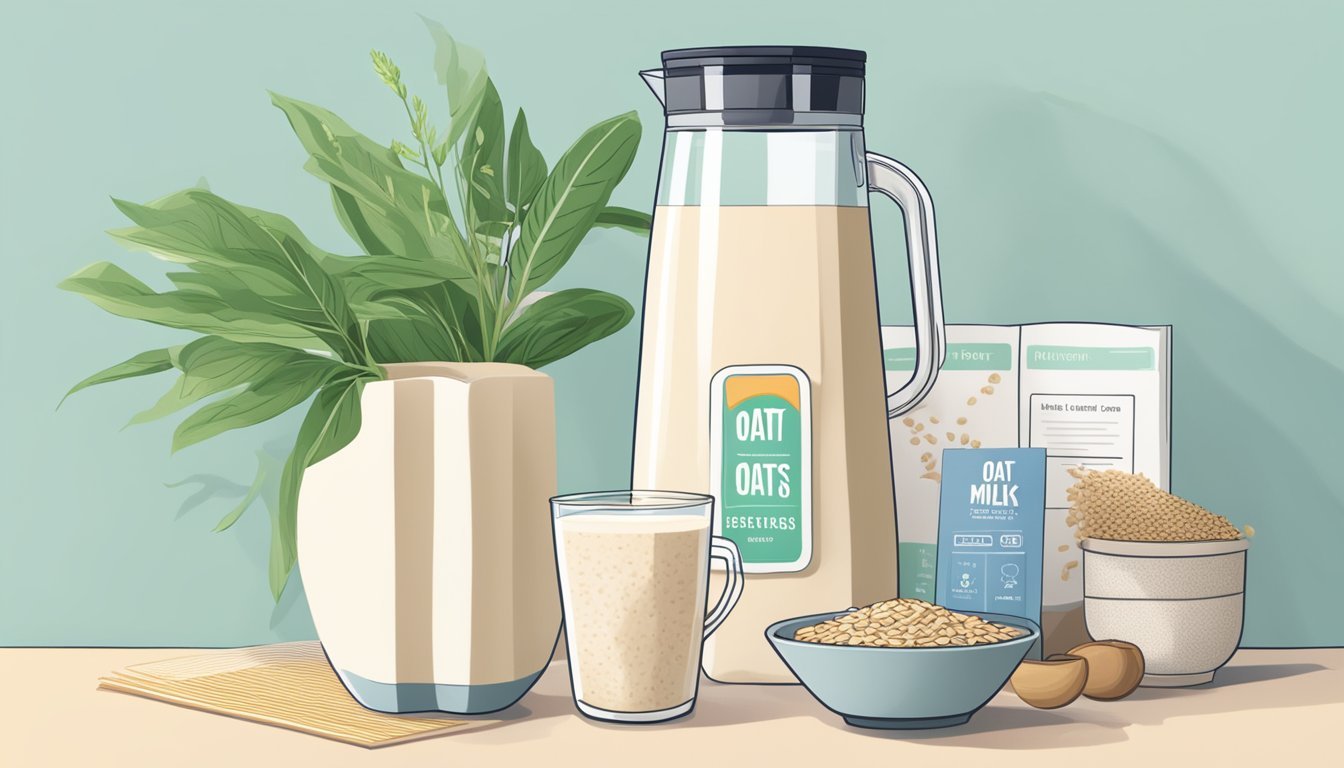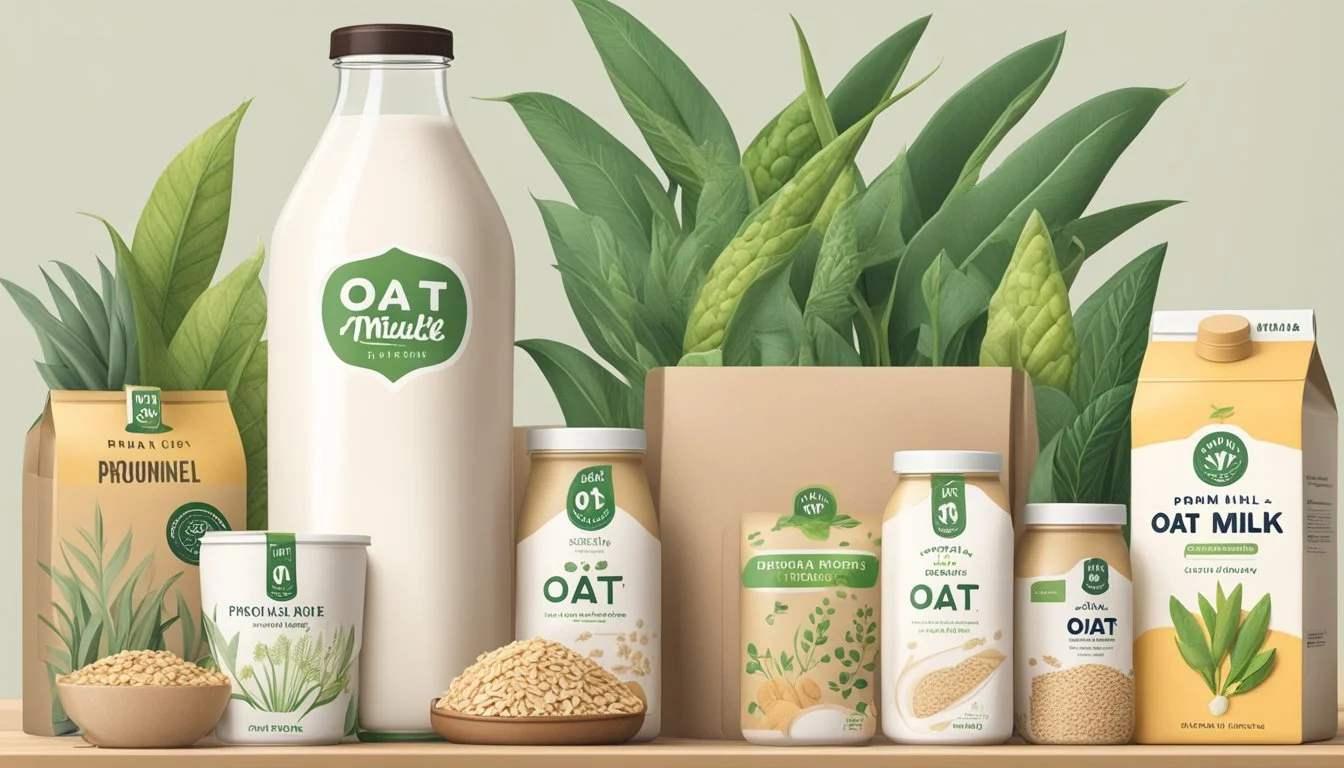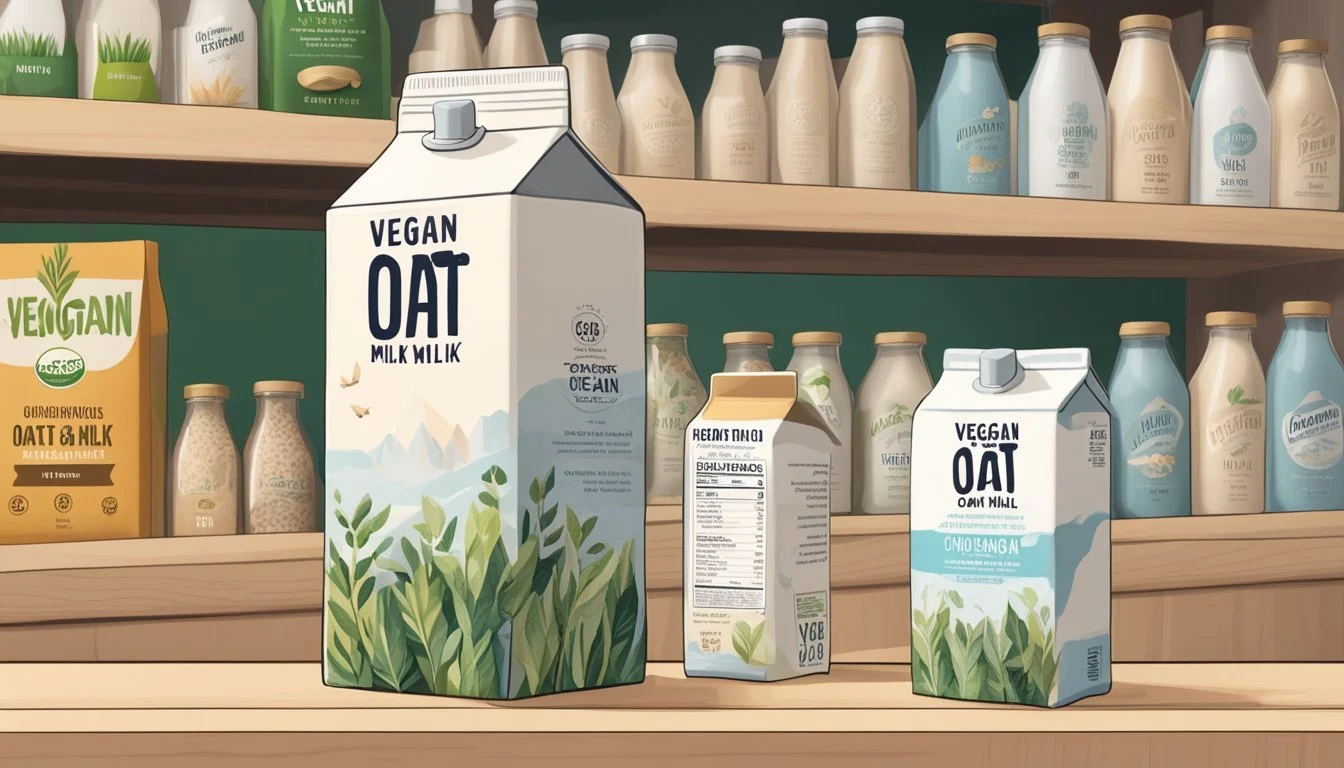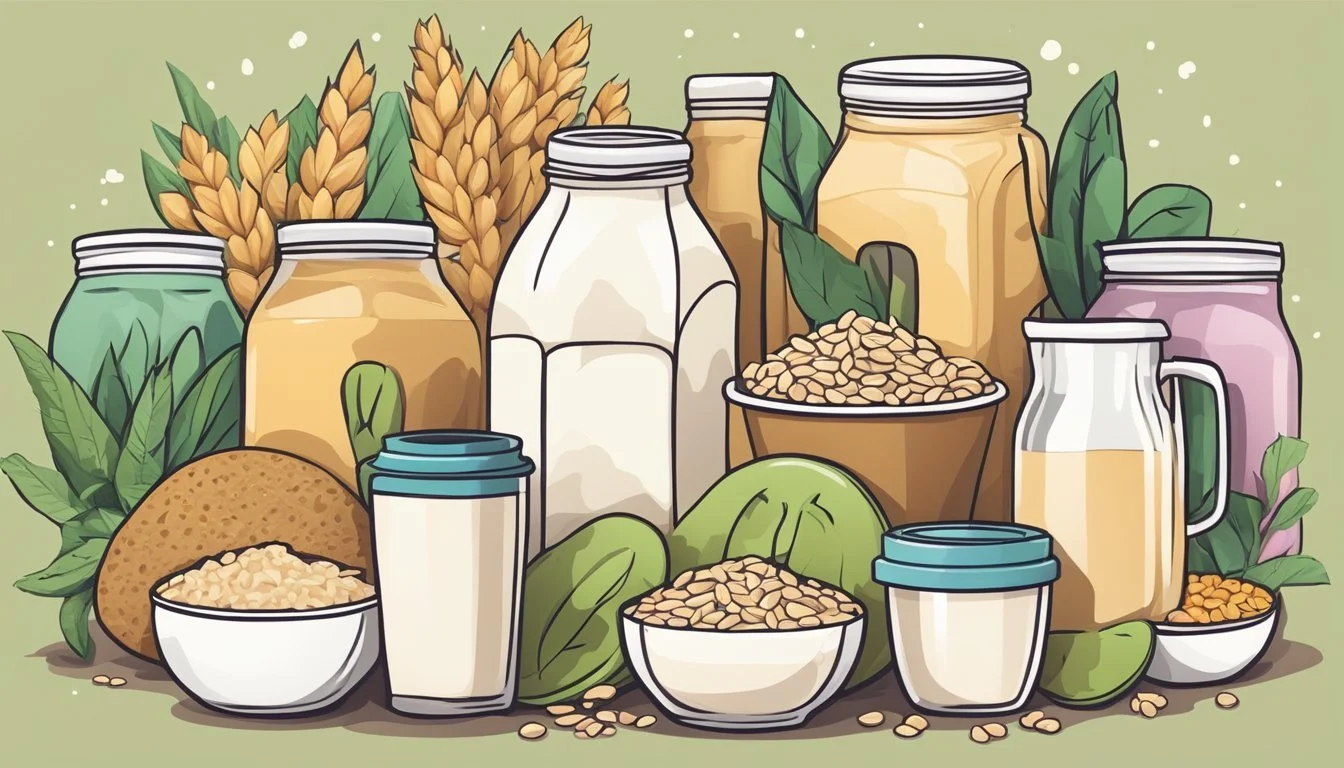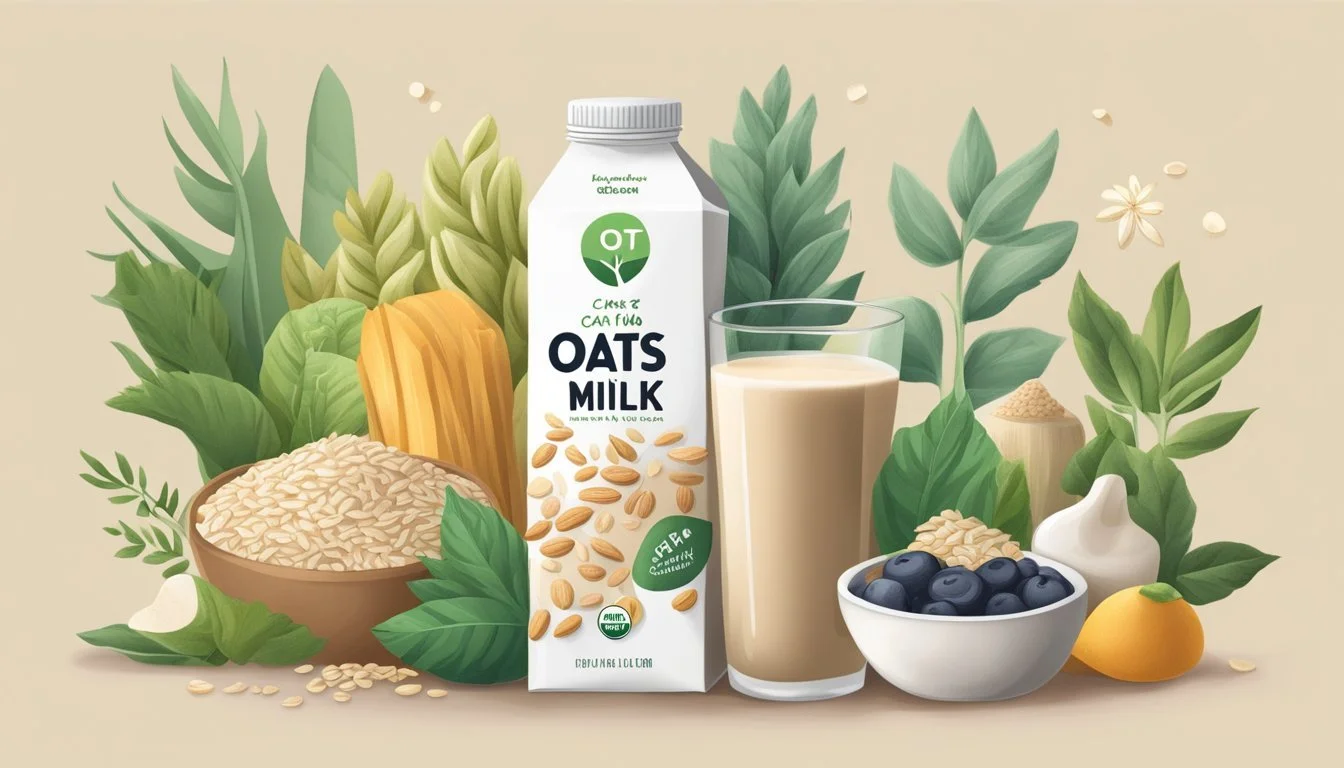Is Oat Milk Vegan?
Uncovering the Truth About Plant-Based Milk Options
Oat milk is a plant-based beverage that has surged in popularity among consumers looking for dairy-free alternatives. Derived from whole oat grains, oat milk is considered vegan as it does not contain any animal products or by-products, making it a suitable option for those following a vegan lifestyle or with dietary restrictions. It is made by blending oats and water and then straining the mixture to separate the milk from the oats' solid residue.
This dairy-free alternative has gained favor not only due to its vegan credentials but also for its creamy texture and a flavor profile that many find similar to cow's milk. In addition to being a vegan-friendly option, oat milk is naturally free of lactose, nuts, and soy, providing an allergen-friendly choice for those with sensitivities or allergies.
Enhanced with additional vitamins and minerals, commercial oat milk often includes added calcium, vitamin D, vitamin B12, and riboflavin to mimic the nutritional benefits of cow's milk. The nutritional fortifications help oat milk to provide a more comprehensive dietary contribution, making it a more versatile and enriching addition to a variety of diets.
What Is Oat Milk?
Oat milk is a popular plant-based milk alternative made from oats and water. It caters to a range of dietary preferences being vegan, dairy-free, and lactose-free.
Origins and Basic Ingredients
Oat milk traces its roots to Northern Europe but has gained international popularity. The basic ingredients are oats and water, making it simple and often preferred for its minimal environmental impact.
Production Process
To produce oat milk, oats are soaked in water, blended, and then strained through a nut milk bag to remove the solid oat pulp. The resulting liquid, which is the oat milk, can be consumed as is, especially in the case of homemade oat milk.
Commercial Variants and Brands
Commercial production involves additional steps for shelf-stability and taste. Store-bought oat milk comes in various forms with leading brands like Oatly and Silk. These variants may include added vitamins and minerals or flavors.
Nutritional Profile
A typical one-cup serving of unfortified oat milk contains approximately:
Calories: 120
Protein: 3g
Fat: 5g
Fiber: 2g
Carbohydrates: 16g
It may also be fortified with:
Calcium
Vitamin D
Vitamin A
Riboflavin
Vitamin B12
Phosphorus
Potassium
Dietary Considerations
Oat milk is naturally vegan and free from dairy, lactose, soy, and nuts, making it suitable for various dietary restrictions. However, as oats can sometimes be processed in facilities that handle gluten, those with celiac disease or gluten sensitivity should opt for certified gluten-free products to avoid potential allergen exposure.
Comparative Analysis of Milk Alternatives
When comparing milk alternatives, it's crucial to examine their nutrition, flavor, and how they fit into various diets. These factors influence consumer choice among the various plant-based milk options available.
Nutritional Comparison
The nutritional content of milk alternatives varies considerably, with each offering a different set of benefits that may appeal to those following a vegan diet or with specific dietary needs. It's important to note that not all milk alternatives provide the same level of nutrition as cow's milk, which is often fortified with vitamins and minerals.
Protein Content:
Soy Milk: 3.47% protein, closest to animal milk's content, offering a full amino acid profile.
Almond Milk: Generally low in protein compared to cow's milk.
Oat Milk: Offers a modest amount of protein, often enriched with nutrients.
Coconut Milk: Low in protein, high in saturated fats.
Rice Milk: Tends to be low in protein and may be fortified with nutrients.
Vitamins & Minerals:
Most milk alternatives are fortified with calcium and vitamin D, but levels vary by brand and type.
Soy and almond milk often contain vitamin B12, a crucial nutrient for vegans.
Flavor Profiles
Milk alternatives bring a variety of flavors that cater to different palates, often influenced by their source ingredient.
Soy Milk: Neutral, bean-like taste; available in vanilla or chocolate flavors.
Almond Milk: A nutty flavor with a light, creamy texture; also comes in vanilla, chocolate, and sometimes cinnamon variations.
Oat Milk: Naturally sweet and full-bodied; often described as being the closest in mimicry to cow's milk's creaminess.
Coconut Milk: Has a distinct tropical flavor, with a creamy texture that may not appeal to all.
Rice Milk: Often the sweetest, with a watery texture.
Usage in Dietary Habits
The application of milk alternatives in dietary habits depends on individual dietary restrictions and preferences.
Vegan: All the alternatives mentioned are vegan-friendly and offer those on a vegan diet the chance to enjoy milk-like beverages without any animal derivatives.
Gluten-Free: While most milk alternatives are gluten-free, one must be cautious with oat milk as it can sometimes be processed in facilities that handle gluten-containing grains.
Health Considerations: Consumers looking for low-calorie options may prefer almond milk. Those with nut allergies may opt for oat or soy milk.
Milk alternatives like soy, almond, oat, coconut, and rice milk are integral to non-dairy and vegan diets. Each has its unique flavor profile and nutritional makeup, catering to a range of dietary needs and taste preferences.
Health Benefits
Oat milk provides a nutritious alternative to dairy milk, packed with essential vitamins and minerals. It aligns with diverse dietary needs and balances a rich nutrient profile with health-conscious considerations.
Digestive Health
Oat milk is a source of dietary fiber, which is crucial for maintaining gut health. The inclusion of fiber in one's diet can aid in digestion and regular bowel movements. Although the fiber content in oat milk is lower than in whole oats due to processing, it still contributes to the daily dietary fiber intake.
Cardiovascular Advantages
The beverage is cherished for its heart health benefits, primarily due to its low cholesterol levels. Oat milk naturally contains beta-glucan, a type of soluble fiber that has been linked to reducing cholesterol. This can lead to a reduced risk of heart disease. Additionally, oat milk often contains healthy fats, which further supports cardiovascular health.
Weight Management
For those monitoring their calories, oat milk is relatively low in calories compared to whole milk, though it may have more than other plant-based milks. It can be a sensible addition to a balanced diet, providing satiety without excessive caloric intake. Its composition of carbohydrates and protein can also play a role in weight management and satiety.
Usage in Cooking and Beverage Making
Oat milk serves as a versatile and flavorful vegan alternative for cooking and beverage making. Its creamy texture and neutral taste make it an excellent dairy-free option across various recipes.
Breakfast Options
For a wholesome vegan breakfast, oat milk can transform cereals and smoothies. They can pour it over their favorite cereal to maintain the traditional taste and consistency one expects from a dairy-based milk. In smoothies, oat milk adds a creamy texture without overpowering the flavors of fruits such as banana or additives like pumpkin spice.
Baking and Desserts
In baking and making desserts, oat milk acts as a reliable alternative to cow's milk. Its capacity to create a creamy and rich texture is ideal in vegan cheesecake recipes. For a simple swap, they should use a 1:1 ratio when replacing dairy milk with oat milk to prevent dramatic changes in flavor or texture.
Homemade Recipes and Enhancements
Creating homemade oat milk is a straightforward process. They need to blend 1 cup of rolled oats with 4 cups of water and optional sweeteners like dates, vanilla extract, or maple syrup. It's crucial not to overblend to avoid a slimy consistency. For a natural sweetness, they can add a couple of medjool dates to the blend.
Texture and Consistency Considerations
While oat milk generally can match the consistency of cow's milk, overheating can lead to undesired changes. When adding oat milk to hot beverages, such as coffee, they should pour the hot liquid on top of the oat milk to prevent curdling. This technique ensures the oat milk warms up gradually, retaining its smooth and creamy texture.
Environmental and Economic Aspects
The production and consumption of oat milk have specific environmental and economic impacts that differentiate it from dairy and other plant-based milk alternatives. These include its sustainability characteristics, its comparison with other milks in terms of ecological footprint, and the financial implications for consumers and producers.
Sustainability of Oat Milk
Oat milk stands out for its lower environmental impact, primarily due to the oat crop's relatively modest requirements for water and pesticides compared to almond or soy crops. Significant Points:
Oat crops can grow in poorer soil conditions and use less water.
Packaging efforts by leading brands are often designed to be recyclable, reducing waste.
Comparison With Dairy and Other Alternatives
When comparing oat milk to dairy milk and other plant-based alternatives, one must consider several factors.
Dairy Milk:
Higher greenhouse gas emissions.
Resource-intensive, requiring more water and land.
Plant-Based Milk Alternatives:
Generally have a smaller ecological footprint.
Soy and almond milk production can still involve significant water use.
Oat milk typically requires less water than almond milk and yields fewer emissions than dairy milk.
Financial Implications
Oat milk's price point is often higher than traditional dairy milk, a factor attributed to production scale and the cost of processing.
Consumer Considerations:
Oat milk can be more expensive than dairy milk but comparable to other vegan milk options.
The demand for sustainable and dairy-free products is influencing market prices and availability.
Producer Considerations:
Investment in sustainability can appeal to the growing eco-conscious consumer base.
Scaling production may lower costs over time, making it economically competitive.
Consumer Insights and Preferences
Consumer habits reflect a strong shift towards plant-based alternatives with oat milk emerging as a preferred choice for its taste and health benefits.
Trends and Popularity
The popularity of oat milk is on the rise, influenced by an increasing interest in plant-based diets. Market research highlights that oat milk sales have surged, with notable growth over the past year. Brands such as Oatly and Silk have played a significant role in boosting the trend by offering a range of oat milk products. Consumer behavior indicates a trend towards more sustainable and ethical choices, with oat milk often perceived as a vegan-friendly option.
Taste and Variety
When it comes to taste and variety, oat milk stands out. Consumers appreciate the creamy texture that resembles dairy milk, making it a favorable substitute in coffee and cereals. An assortment of flavors such as vanilla, chocolate, and cinnamon caters to diverse palates. Both plain and sweetened variants are available, offering choices for those monitoring their sugar intake. The breadth of oat milk varieties includes fortified options, adding nutritional value to this vegan drink.
Choices for Different Diets
Oat milk's versatility extends to its compatibility with various diets. It is inherently vegan, excluding any animal products. For individuals with dietary restrictions, certified gluten-free options address concerns about allergens. However, consumers must be cautious as not all oat milk is gluten-free by default due to potential cross-contamination with gluten-containing grains during processing. Brands are responding to this need by ensuring clear labeling, thus guiding consumer behavior towards informed choices within the realm of vegan and allergen-free products.
Storage and Shelf Life
When considering oat milk, buyers should factor in storage techniques and shelf life to maintain its vegan-friendly qualities while ensuring freshness. Both commercial and homemade oat milk have distinct requirements for storage and duration of freshness.
Proper Storage Methods
For unopened commercial oat milk, the recommended storage location is in a pantry or cupboard, away from extreme temperatures, which can extend its shelf life. Once opened, it should be stored in the refrigerator. It's essential to use an airtight container, such as a glass bottle or jar with a tight-fitting lid, specifically for homemade oat milk to preserve its freshness.
Commercial Oat Milk (Unopened): Store in pantry or cupboard, away from heat or light.
Commercial Oat Milk (Opened): Refrigerate in original packaging, ensure cap is sealed tightly.
Homemade Oat Milk: Always refrigerate in an airtight container immediately after making.
Expiration and Freshness
The shelf life of oat milk can vary considerably based on whether it is store-bought or homemade.
Commercial Oat Milk (Shelf-Stable): Typically lasts for up to six months unopened.
Commercial Oat Milk (Refrigerated): Usually has a marked expiration date but can last up to seven to ten days once opened.
Homemade Oat Milk: Has a shorter shelf life of 3-5 days in the refrigerator due to the absence of preservatives.
Note: One should always consult the expiration date on commercial oat milk packaging and monitor the freshness of homemade oat milk by tasting and smelling it before use to ensure quality.
Potential Challenges and Considerations
When considering oat milk as a vegan option, one must be mindful of certain challenges and considerations ranging from allergen risks to the importance of nutrient fortification.
Allergy and Intolerance Concerns
Oat milk is generally safe for those with dairy or lactose intolerances, but it's important to note that it may not be suitable for individuals with gluten sensitivities or celiac disease due to the potential for cross-contamination during processing. Individuals should look for gluten-free certified products to avoid this issue.
Textural Issues and Solutions
While some consumers enjoy the creamy texture of oat milk, others may find certain brands too slimy or thick. These textural issues can often be resolved through proper straining techniques using a strainer or cheesecloth, particularly when making oat milk at home.
Homemade Oat Milk Considerations
Creating oat milk at home can introduce variability in texture and quality. Additionally, one must consider the potential waste created from leftover oat pulp. Repurposing the pulp for baking or other recipes can minimize waste and make homemade oat milk a more sustainable choice.
Fortification and Nutrient Enhancement
Most commercial oat milk products are fortified with essential vitamins and minerals like calcium and vitamin D to mimic the nutritional profile of cow's milk. Consumers should seek fortified options or otherwise ensure they are supplementing these nutrients to maintain a balanced diet.
FAQs and Common Misconceptions
This section addresses frequently asked questions and corrects common misconceptions surrounding oat milk, particularly its vegan status, health claims, and the different varieties available.
Clarifying Vegan Status
Is oat milk vegan? Yes, oat milk is a vegan product as it is made from oats and water, excluding any animal derivatives. Consumers should check labels for potential non-vegan additives in flavored or fortified varieties.
Addressing Health Claims
Addressing Nutritional Benefits: Oat milk is praised for its nutritional profile, including beneficial fiber and protein content. However, it is typically lower in protein compared to soy milk. Fortified oat milk can provide significant amounts of calcium, vitamin B12, and vitamin D.
Understanding Oat Milk Varieties
Plain vs. Flavored: Plain oat milk consists solely of oats and water, sometimes with added vitamins and minerals. Flavored varieties, such as vanilla or chocolate, may contain added sugars and flavorings. Sweetened vs. Unsweetened: Consumers have the choice between sweetened oat milk, which contains added sugars, and unsweetened oat milk, which has no added sweeteners and is preferable for those monitoring their sugar intake. It is important for individuals to read the labels for specific ingredients and choose according to their dietary preferences.
Conclusion
Oat milk is categorically vegan, as it is made from oats and water, which are plant-based ingredients. This dairy-free milk alternative has gained popularity among vegans and those with lactose intolerance due to its nutritional profile and sustainability.
The process involves soaking, blending, and straining oats to produce a creamy beverage that mirrors the texture of traditional dairy milk. Oat milk can be enriched with vitamins and minerals such as calcium, vitamin B12, and vitamin D to enhance its nutritional value. Moreover, some brands may include additional ingredients like DHA, an omega-3 fatty acid derived from algae, making it an even richer option for a well-rounded vegan diet.
Consumers should note that while oat milk is inherently vegan, they should check labels for potential additives or processing agents that may not align with vegan principles. For those seeking nutrient-rich, lactose-free, and vegan-friendly options, oat milk is a viable choice. It caters to various dietary needs while providing a pleasing taste and versatility in both cooking and baking.
In the growing array of plant-based milk alternatives, oat milk stands out for its balance of flavor and nutrition, making it an appealing option for a wide range of consumers looking to incorporate vegan products into their lifestyle.




